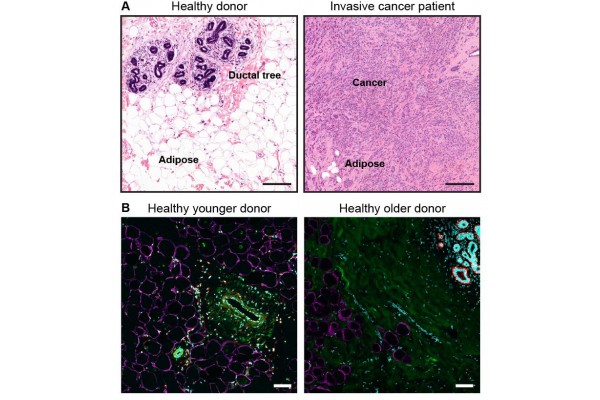Healthy Breast Fat may Protect Against Invasive Breast Cancer
July 18, 2023
Source: drugdu
 443
443

Researchers have found a possible explanation as to why higher breast density and older age increase the risk of breast cancer.
In an innovative study, researchers at the Turku Bioscience Centre, InFLAMES Flagship of the University of Turku, and Turku University Hospital, Finland, have made an extraordinary discovery that turns conventional wisdom on its head. Their findings reveal that healthy fat cells in the breast, also known as adipocytes, secrete a potent factor called IGFBP2, which acts as a barrier against invasive breast cancer progression.
Dr. Emilia Peuhu (Study Key Collaborator) said, "Adipocytes generally get a bad rap for promoting cancer progression, but this study demonstrates that healthy breast fat can play a protective role in the maintenance of tissue homeostasis and cancer containment. It's time to re-evaluate our assumptions and recognize the important role of these unsung heroes."
Breast cancer patients who experience the transition from pre-malignant ductal carcinoma in situ (DCIS) to invasive ductal carcinoma (IDC) face a considerably poorer prognosis and an increased risk of developing metastatic disease. The research team's work focuses on identifying factors that impede this invasive progression, with IGFBP2 emerging as a key factor secreted by healthy adipocytes.
In addition to the loss of adipocytes that occurs as women age, this study found that older women had reduced expression of IGFBP2, suggesting that the anti-cancer activities of breast adipocytes might also decrease with age.
InFLAMES group leader, Professor Johanna Ivaska, the principal investigator on the project, expressed their astonishment at the findings, highlighting that, "increasing age and higher breast density, with fewer adipocytes, are two well established risk factors for the development of breast cancer. Our research provides a possible explanation for this increased risk, as we found that IGFBP2 levels are also reduced in older individuals and that healthy breast adipocytes can secrete factors, such as IGFBP2, to inhibit tumor progression."
The implications of this discovery extend to the understanding of mammary density and its connection with poorer prognosis. Dr. James Conway, the lead researcher of the team, added, "While restoring IGFBP2 into the mammary environment might not be possible, the use of antibody-based inhibitors of IGF-II could help to contain non-invasive breast lesions by acting in a similar fashion to IGFBP2 itself, which we have already observed in our model systems."
The team is now exploring the therapeutic avenues that have opened up as a result of these recent findings.
Source: news-medical.net
By editorRead more on
- The first subject has been dosed in the Phase I clinical trial of Yuandong Bio’s EP-0210 monoclonal antibody injection. February 10, 2026
- Clinical trial of recombinant herpes zoster ZFA01 adjuvant vaccine (CHO cells) approved February 10, 2026
- Heyu Pharmaceuticals’ FGFR4 inhibitor ipagoglottinib has received Fast Track designation from the FDA for the treatment of advanced HCC patients with FGF19 overexpression who have been treated with ICIs and mTKIs. February 10, 2026
- Sanofi’s “Rilzabrutinib” has been recognized as a Breakthrough Therapy in the United States and an Orphan Drug in Japan, and has applied for marketing approval in China. February 10, 2026
- Domestically developed blockbuster ADC approved for new indication February 10, 2026
your submission has already been received.
OK
Subscribe
Please enter a valid Email address!
Submit
The most relevant industry news & insight will be sent to you every two weeks.



